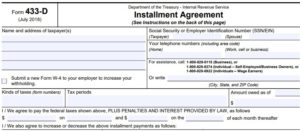IRS “Expanded” Installment Agreement

Complete this form to set up your IRS payment plan!
When a person owes the IRS money that they can’t pay in full, they typically will qualify to deal with the debt via a payment plan. This payment plan is called an “installment agreement” in IRS terminology. Simply stated, an installment agreement is a contract with the IRS to pay the taxes you owe within an extended time frame. There are many types of installment agreements, but two of the most common are the guaranteed and streamlined variety.
Guaranteed & Streamlined Installment Agreements
We discuss the guaranteed installment agreement at length in this blog post. But what exactly is a streamlined installment agreement? For individual taxpayers who have filed all required returns and have an assessed balance of tax, penalties and interest of $50,000 or less, they can enter into an installment agreement with “relaxed” criteria. Basically, they don’t have to go through as many hoops or submit as much documentation. The following criteria apply to those who wish to apply for a streamlined installment agreement:
- Payment Terms Up to 72 months – or – the number of months necessary to satisfy the liability in full by the Collection Statute Expiration Date (CSED), whichever is less
- Collection Information Statement (financials) Not required.
- Payment Method Direct debit payments or payroll deduction is preferred, but not required.
- Notice of Federal Tax Lien
- Determination not required for assessed balances up to $25,000.
- Determination is not required for assessed balances of $25,001 – $50,000 with the use of direct debit or payroll deduction agreement. If taxpayer does not agree to direct debit or payroll deduction, then they still qualify for Streamlined IA over $25,000, but a Notice of Federal Tax Lien determination will be made.
The criteria discussed above also apply to business taxpayers, but only for income tax debts up to $25,000.
So what if you owe more than $50,000 as an individual or $25,000 as a business? Well, this is where the “expanded installment agreement” comes into play.
Expanded Installment Agreements
From late 2016 through late Fall of 2018, the IRS tested “expanded” criteria for the streamlined processing of taxpayer requests for installment agreements. During the test, taxpayers who owed more than $50,001 but less than $100,000 were allowed to use most of the criteria outlined under the streamlined installment agreement. Well, based on test results, the expanded criteria for streamlined processing of installment agreement requests were made permanent. If you are a practitioner, you can find the “new” criteria in IRM 5.19.1.6.4 under item “11” (09-26-18 update).
So, for individual taxpayers who have filed all required returns and have an assessed balance of tax, penalties and interest between $50,001 and $100,000, you can use the following criteria to apply for an expanded installment agreement:
- Payment Terms Up to 84 months – or – the number of months necessary to satisfy the liability in full by the Collection Statute Expiration date, whichever is less
- Collection Information Statement (financials) Not required if the taxpayer agrees to make payment by direct debit or payroll deduction
- Payment Method Direct debit payments or payroll deduction is not required; however, if one of these methods is not used, then a Collection Information Statement is required.
- Notice of Federal Tax Lien
- Determination is required.
The criteria discussed above also applies to all out of business sole-proprietorship debts between $50,001 and $100,000.
Do you owe the IRS and need to enter into a resolution option?
Check out this page of our website where you can receive our special report entitled 5 Questions To Ask Any Tax Resolution Firm Before Paying Them A Dime, a comprehensive 30-minute Tax Debt Settlement Analysis AND your personalized Tax Resolution Plan (a package valued at $175, but FREE to you for a limited time). You can also visit this page to read about how you can find out the date (i.e. CSED) the IRS will write off your tax debt!


